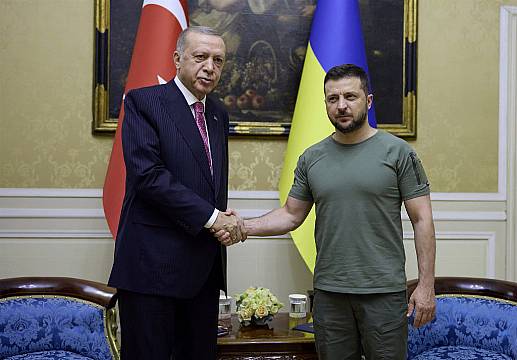Turkey’s president and the UN chief met with Ukrainian president Volodymyr Zelenskiy on Thursday in a high-stakes bid to ratchet down a war raging for nearly six months, boost desperately needed grain exports and secure the safety of Europe’s biggest nuclear power plant.
The gathering, held far from the front lines in the western Ukrainian city of Lviv, near the Polish border, marked the first visit to Ukraine by Turkey’s Recep Tayyip Erdogan since the outbreak of the war, and the second by UN secretary-general Antonio Guterres.
Mr Erdogan has positioned himself as a go-between in efforts to stop the fighting. While Turkey is a member of Nato — which backs Ukraine in the war — its wobbly economy is reliant on Russia for trade, and the country has tried to steer a middle course.

At the meetings, Turkey agreed to help rebuild Ukraine’s infrastructure, including roads and bridges, and Mr Zelenskiy asked Mr Guterres to seek UN access to Ukrainian citizens deported to Russia, according to the Ukrainian president’s website.
Mr Zelenskiy also requested UN help in freeing captured Ukrainian soldiers and medics.
Meanwhile, on the battlefield, at least 11 people were killed and 40 wounded in heavy Russian missile strikes on Ukraine’s Kharkiv region on Wednesday night and Thursday morning, Ukrainian authorities said.
Russia’s military claimed that it struck a base for foreign mercenaries in Kharkiv, killing 90. There was no immediate comment from the Ukrainian side.
Heightening international tensions, Russia also deployed warplanes carrying state-of-the-art hypersonic missiles to the country’s Kaliningrad region, an enclave surrounded by two Nato nations.

The three leaders’ agenda included the Russian-controlled Zaporizhzhia nuclear plant in southern Ukraine. Moscow and Kyiv have accused each other of shelling the complex, and the fighting has raised fears of a nuclear catastrophe.
In his nightly video address on Wednesday, Mr Zelenskiy reaffirmed his demand for the Russian military to leave the plant, emphasising that “only absolute transparency and control of the situation” by, among others, the UN’s International Atomic Energy Agency (IAEA), could guarantee nuclear safety.
Mr Zelenskiy and Mr Guterres agreed on Thursday on arrangements for an IAEA mission to the plant, the Ukrainian president’s website reported.
It was not immediately clear if Russia would agree to those arrangements. Mr Zelenskiy asked Mr Guterres to ensure the safety of the plant, including its demilitarisation.
Earlier this month, Mr Erdogan met in Russia with Russian president Vladimir Putin to discuss the fighting. And last month, Turkey and the UN helped broker agreements clearing the way for Ukraine to export 22 million tons of corn and other grain stuck in its Black Sea ports since Russia invaded on February 24th. The agreements also sought to clear roadblocks to exports of Russian food and fertiliser to world markets.

The war has significantly worsened the global food crisis because Ukraine and Russia are major suppliers of grain. Developing countries have been hit particularly hard by shortages and high prices, and the UN has declared several African nations in danger of famine.
Yet even with the deal, only a trickle of Ukrainian grain exports has made it out. Turkey’s defence ministry said more than 622,000 tons of grain had been shipped from Ukrainian ports since the deal was reached.
At a news conference on Thursday in Lviv, Mr Guterres touted the success of the grain export agreements but added: “There is a long way to go before this will be translated into the daily life of people at their local bakery and in their markets.”
The discussions about an overall end to the war that has killed untold thousands and forced over 10 million Ukrainians to flee their homes were not expected to yield anything substantive.







